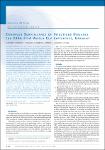Enhanced Surveillance of Infectious Diseases : the 2006 FIFA World Cup experience, Germany
Schenkel, Karl
Williams, Christopher J.
Eckmanns, Tim
Poggensee, Gabriele
Benzler, Justus
Josephsen, J.
Krause, Gérard
The 2006 FIFA World Cup was held in 12 German cities between 9 June and 9 July 2006. We identified a need to accelerate and sensitise the pre-existing surveillance system for infectious diseases in order to timely detect adverse health events during the World Cup. Enhanced surveillance, based on Germany's pre-existing system of mandatory notifications was conducted between 7 June and 11 July 2006 in the 12 World Cup cities by: accelerating frequency of electronic data transmission of case-definition based notifiable diseases from weekly to daily transmission, additional reporting of non-case definition-based infectious disease events, lay and expert press screening and intensifying communication between all stakeholders of the surveillance system. Median delay of notification data transmission from the community to the federal level was reduced from three days to one day. The enhanced reporting system detected a norovirus outbreak in the International Broadcast Centre in Munich with 61 epidemiologically linked cases within the first week after onset, as well as four single cases related to the World Cup, two of them with relevance for the International Health Regulations. After the World Cup, all surveillance stakeholders agreed that communication between local, state and federal levels had improved considerably. Unlike the majority of health planners of previous mass gatherings in the last decade we did not introduce syndromic surveillance. Nevertheless, enhancement of infectious disease surveillance successfully detected adverse health events in a timely manner during the FIFA World Cup. Additionally, it provided a valuable communication and networking exercise for potentially critical health-related events. We recommend continuing daily notification data transmission for routine infectious disease surveillance in Germany.
No license information

